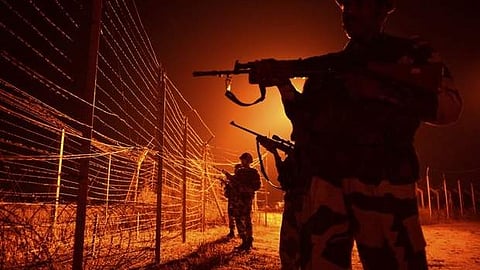

NEW DELHI: Undoubtedly, the Pakistan-backed terror attack in Pahalgam leading to the deaths of 26 civilians, who were vacationing in the Baisaran meadow, has shattered the Centre's narrative of the return of ‘peace and prosperity’ in Jammu & Kashmir since the abrogation of Article 370 in 2019.
The attack also dealt a blow to India’s collective conscience and put the subcontinent on edge. Now, the two nuclear powers are facing off on the border, particularly along the Line of Control (LoC).
Many in the Indian establishment are of the view that the attack pushed the country to a defining moment, where the response should be such that India shuts Pakistan’s ill-intent once and for all.
The government of India’s efforts to foster peace and prosperity in Kashmir have repeatedly been undermined by Pakistan's determination to perpetuate unrest through calculated policies and covert machinations by unleashing trained terrorists as part of its proxy war against India.
The attack in Pahalgam reignited a sense of deprivation, which for long smothered Kashmiri life -- inflicting particular suffering upon the Kashmiri Pandits and the Hindu community, whose trauma spans generations.
The terror attack has further exposed a renewed strategic manoeuvring by Islamabad with the aim of derailing the fragile peace in Jammu & Kashmir, which has by and large been achieved through the sacrifices of the Indian Armed Forces, civilians and the determined political resolve of successive Indian governments.
Many in the security establishment believe that the targeted assault in Pahalgam is aimed at inciting communal violence to further destabilise the region by sustaining a continuous state of economic and social strain. This certainly undermined the tourism economy of Jammu and Kashmir, which had demonstrated remarkable growth following the abrogation of special status under Article 370.
Data, compiled by the Union Ministry of Home Affairs (MHA), indicate that in 2024 the total tourist arrivals reached approximately 2.95 million, which showed a marked improvement from 2.71 million in 2023 and 2.67 million in 2022.
The Pahalgam attack represents the deadliest assault on civilians in the region since the 2008 Mumbai attacks and the 2013 Naxal attack in Darbha Valley, thereby underscoring its profound strategic and symbolic significance.
With The Resistance Front (TRF) first claiming responsibility for the attack and then denying it, Pakistan has called for an international investigation into the incident, indicating that it believes it has achieved the purpose and now wants third-party intervention to save itself from Indian wrath.
However, India on its part has already taken a series of robust retaliatory measures, including the expulsion of Pakistani diplomatic personnel, the suspension of visa services for Pakistani nationals, the closure of border crossings, and the suspension of the Indus Waters Treaty (IWT). Moreover, it has also imposed stricter controls at the Attari border and mandated the departure of Pakistani nationals by May 1.
The escalating tensions have further manifested in India’s imposition of a ban on its aircraft flying into Pakistani airspace and the suspension of bilateral commerce. Pakistan has reciprocated by closing its airspace to Indian aircraft and formally suspending the 1972 Shimla Agreement.
Further, in a bid to save itself from admonishments from the global community, Pakistan officially acknowledged its historical support for terrorism, claiming it was at the behest of the US. In an interview with Sky News, its Defence Minister Khawaja Muhammad Asif conceded that Pakistan has incurred significant costs for its past involvement in supporting terrorist organisations, referring to these activities as “dirty work” undertaken on behalf of the West.
However, against the backdrop of existing world opinion, Pakistan's complicity in the terror attack is likely to result in its further isolation.